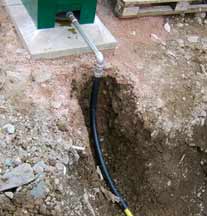Poultry producers warned over metal gas piping

The findings of the Gill Inquiry into the fatal accident at a plastics factory in Glasgow are set to affect all poultry growers and other parts of the sector that use LPG.
In 2004, nine people died and 33 were injured in an explosion caused by the release of LPG (propane) from an underground gas fitting that was badly corroded.
A senior judge, Lord Gill, subsequently carried out an inquiry and made several recommendations, one of which was that all underground metallic LPG supply pipes at commercial premises will be replaced as part of a programme agreed between the Health and Safety Executive and UKLPG (the trade body for the LPG industry).
So if you have any LPG storage tanks feeding poultry sheds via underground pipes, this will affect you. Your LPG supplier will have already been in touch and asked you to complete a questionnaire regarding the type of piping you have.
There may be varying pipe combinations dependent on their age. The most modern type, typically yellow polyethylene piping that rises above ground at both the tank end and the building end of the installation, should not need attention.
However, less recent installations with yellow polyethylene piping underground, but with metal pipe risers at either end may require replacement of metal risers with polyethylene ones. Finally, the oldest type with metal pipes throughout will need replacing.
Most gas suppliers accept responsibility for piping “to the edge of the tank base”, up to the point where the pipe goes into the ground as it leaves the LPG storage tank. Underground piping and risers at buildings are invariably the responsibility of the producer, even though they may have been originally installed by the gas supplier. The gas supplier will have transferred ownership of the piping on completion. The producer, therefore, has to take action.
The seriousness with which the HSE is viewing the risk presented by underground metal piping precludes any thought of a “wait and see” approach. I urge any producer affected by this issue to seek professional advice.
Your gas supplier will clarify any pipe ownership issues and can help in assessing the current risk. If consulting a gas installer, they must be on the Gas-Safe Register and be registered to work with LPG.
Where runs of underground metal piping need replacing, this is best done using polyethylene pipe and specialist fittings, and the installer must be registered as competent in their use. If the whole site requires re-piping, it may be best to consider alternative routes, as the original pipe may be below concrete aprons.
Once the work is completed, the installer should issue a completion certificate indicating that the system is sound and conforms to current standards.
Your gas supplier will clarify any pipe ownership issues and can help in assessing the current risk. If consulting a competent gas installer, they must be on the Gas-Safe Register (previously known as the Corgi Register) and be registered to work with LPG.
Where runs of underground metal piping need replacing, this is best done using polyethylene pipe and specialist electrofusion fittings, and the installer must be registered as competent in their use. If the whole site requires re-piping, it may be best to consider alternative routes, as the original pipe may be below concrete aprons.
Once the remedial work is completed, the installer should issue a completion certificate indicating that the system is sound and conforms to current standards.
David Blakemore is a joint owner of Focus Consultants, a firm based near Hexham, Northumberland with expertise in LPG bulk storage.
